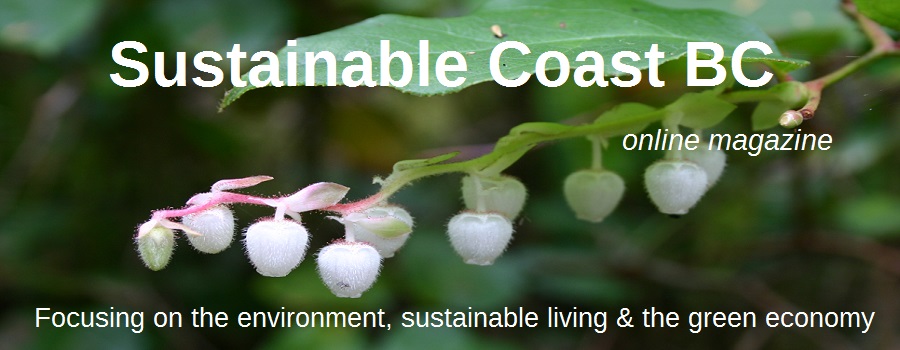News
The Sunshine Coast is a perfect fit for an EV, as the range of driving here is within most of the cars battery capacity. It is estimated that 95% of of all car trips in BC’s urban areas are less than 30km. Trying to find one on the Sunshine Coast may be a problem however. The local GM dealer, Sunshine GM when contacted said they did not have a Chevy Volt available. They had one but have now sold it to another dealer off coast as they said they did not have much interest in the car. When asked how they promoted the Volt, they said they used social media such as Facebook. Many coast residents probably missed that "advertising campaign".
The Sierra Club cites a range of studies that state that "the charging of an electric car leads to an average of at least 30% less carbon dioxide pollution than the CO2 pollution from the oil of a conventional car with an internal combustion engine (when doing a “well to wheels comparison”). In some areas, like many on the West Coast that rely largely on wind or hydro power, the emissions are significantly lower for EVs."
The $7.5 million Clean Energy Vehicle (CEV) Point of Sale Incentive Program is an initiative of the BC Ministry of Environment, LiveSmart BC and the New Car Dealers Association of BC. It is intended to encourage and accelerate the sale of clean energy vehicles and technology innovation within British Columbia. The program is available to BC residents, business, non-profit organisations and local government organisations.
A fully electric vehicle uses electricity to power a battery –typically one made of lithium ion. No gasoline, no dirty oil changes, no internal combustion engine. Most new fully electric vehicles can drive 70-130 miles on one charge. An extended range electric vehicle or a plug-in hybrid electric vehicle runs on electricity for a certain number of miles, and as their battery runs out of juice, a gasoline powered engine or generator kicks in.
Vehicles currently qualifying under the CEV Incentive Program include the Chevrolet Volt, Mitsubishi iMiev, Nissan Leaf, Smart Fortwo, and Toyota Prius. Also included are fuel cell technology models such as the Mercedes-Benz B-class F-cell and Compressed Natural Gas models such as the Honda GX.
Pure battery powered electric vehicles such as the Leaf and iMiev have zero tailpipe emissions. Vehicles qualifying for the rebate are anticipated to cost as little as $300 per year in hydro costs compared to upwards of $1500 per year to fuel a gas powered car.
An Eligible Vehicles List (list) be approved and updated by the Ministry of Environment, and will include these types of vehicles:
- Battery Electric Vehicles (BEVs) – $5,000
- Fuel Cell Vehicles (FCVs) – $5,000
- Plug-In Hybrid Electric Vehicles / Extended Range Electric Vehicles:
- Battery capacity of 4.0 - 9.9 kWh – $2,500
- Battery capacity of 10.0 - 14.9 kWh – $3,500
- Battery capacity of 15.0 kWh and greater – $5,000
- Compressed Natural Gas (CNG) vehicles (not heavy duty) – $2,500
Enough funding should be available to meet the expected demand (approximately 1370 vehicle incentives).
Community Charging Infrasturcture Fund
The Province of BC has added $2.74-million to the Community Charging Infrastructure Fund that will see 570 public charging stations across municipalities, regional governments, First Nations, and B.C. businesses and institutions by March 31, 2013. The Community Charging Infrastructure Fund will be managed, promoted and administered by the non-profit Fraser Basin Council.
“The growing need for compatible infrastructure is clear,” said Minister of Environment Terry Lake. “Since its launch in December last year, B.C.’s incentive program has resulted in one CEV being sold every 30 hours in this province. That’s 104 British Columbians who are embracing new, green technology that not only reduces GHG emissions, but helps our clean-tech sector.”
The Province will also continue to grow the green highway from B.C. to California with three Level 3 DC Fast Charging Stations deployed in the coming months, and another 27 Level 3 DC Fast Charging Stations installed throughout the province in the future. These fast chargers will allow electric vehicle owners to recharge in approximately 15 to 20 minutes, and will extend the mobility options for these drivers. These new investments come on the heels of a $261, 000-partnership contribution earlier this year by the Province to the City of Vancouver to help install over 67 electric vehicle charging stations throughout the city.
A look at the current list does not show any stations on the Sunshine Coast, but there are two in Sechelt: Olson Electric and Grumpy Cat Cottages.
Residential Rebates for Purchase of Qualifying Electric Vehicle Charging Equipment
Effective December 1st, 2011, rebates of up to $500 per eligible electric vehicle charging station will be available to B.C. residents who own or lease a battery electric or plug in hybrid electric vehicle that is eligible for the Clean Energy Vehicle Program point-of-sale vehicle incentives. This will be a mail in rebate, and residents will be required to complete and send in an application form, along with an itemised receipt for the EV charging station and a copy of the electric vehicle registration sheet and/or lease agreement. The program runs until March 31st, 2013 or until available funding is depleted (whichever comes first).rebate
It is estimated by Clean Energy Vehicles for BC that 1 million electric vehicles will be on the road in BC by 2030 and that the ratio of British Columbians who have switched to hybrid vehicles compared to the average Canadian is 2:1.
You can learn more about EVs during the Revenge of the Electric Car film showing, car display and discussion on Monday, April 23 and Tuesday, April 24 at the Gibsons Heritage Playhouse hosted by the Green Film Series. Cars will be on display beginning at 6:30 pm and the film begins at 7:30 pm. A panel discussion will follow the film.
